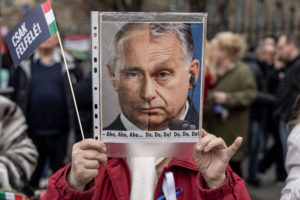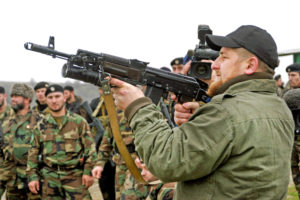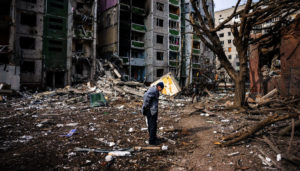“The worst thing is that, in the end, you get used to it.” Dmitry — not his real name — is talking to me over a bad line from the town of Bucha in the Kyiv Oblast of Ukraine. Several mass graves of murdered civilians have just been unearthed, and he wants to tell me about the “horrendous things” he has witnessed in his hometown. In fact, he can’t stop telling me: he flits from topic to topic, detailing atrocities without hesitation or with detail. The trauma is palpable.
It’s unsurprising. Dmitry lived through the entirety of the month-long Battle of Bucha. Russian forces entered the area in late February and captured the city on 12 March, occupying it until the Ukrainian army forced them to retreat almost three weeks later. Dmitry remembers the day the Russians rolled in. He had gone to a family apartment in the city that had been shelled. It now had a huge crater where the living room wall once stood, and looking down into the surrounding streets, he saw two Ukrainian men running from Russian soldiers who were shooting at them. Dmitry had served with the Kyiv territorial defence at Irpin just 5km away and guessed that the men were soldiers: they were in civilian clothes but running in the irregular patterns the military teaches people to avoid gunfire. It made no difference. The Russians shot them down.
They were the first people Dmitry saw killed in Bucha, but not the last. “They were,” he tells me, “the only people I ever saw the Russians kill who weren’t unquestionably civilians.”
Dmitry describes the invasion without a hint of emotion. One morning, he woke up to find a Russian armoured column of roughly 250 vehicles trundling through the city. Most of the territorial defence had retreated to Kyiv because they had nothing but hand grenades left — certainly not the javelins or British NLAWs needed to fight tanks. But he decided to stay in his hometown: he thought he could be of more use there.
And so began life under occupation. Using his phone, he was able to talk to the outside world, which was crucial given food supplies were perilously low. One woman who had fled the city told him to go to her chicken coops where he would find fresh eggs. Another called him to say where she had stored sugar, and so on.
During these daily trips, Dmitry had to cross a number of Russian checkpoints. A garrulous and energetic man, he made sure to always chat to the Russian soldiers at each crossing (the officers, on the other hand, just looked at him like he was dirt). It was nothing major, just small talk. But it all helped to create a bond so he could move freely about the city. He also always took his dog with him to make sure he was recognisable even from a distance.
During these trips, Dmitry was able to get up close to the Russian army — and he was shocked by what he saw. “They were desperate,” he told me. “They’d been given enough food and cigarettes to last two weeks when they entered Ukraine and then been basically abandoned. They had to find everything themselves. They had nothing.”
Dmitry thinks the army may even have entered the city solely because they were so desperate for supplies. When they rolled in, he watched tanks break down garden fences and drive right up to houses and apartments. The soldiers would then just get out and go inside, emerging shortly after with what they needed. “They just went in and took whatever they wanted,” he told me.
The war crimes began almost immediately. One of the first things the Russians did was to find Ukrainian soldiers who had fought against separatist forces in the Donbas in 2014. There were eight of them. The Russians rounded them up and executed them by the glass factory in the suburb of Stekolka.
When it became clear that the Russians didn’t intend to bury their victims, Dimitry stepped in, digging graves in nearby fields as the Russians wouldn’t let them use the cemeteries. But alongside Ukrainians, Russians were also being killed — indeed, the more this happened the more brutal the soldiers became. “I offered to bury them as well,” he tells me. “‘We will bury them – they smell bad,’ I said. But they refused. They just put them in piles. They didn’t even take them when they left.”
Speaking to Dmitry, what shines through is the overwhelming sense of impunity. Norms of society and decency were not suspended or ignored — they were willingly trampled upon. In the first days of the occupation, Dmitry saw Russian soldiers approach apartments and toss grenades into them. They murdered civilians without any care, or for any reason. They shelled buildings and shot up cars for fun. They did all this every morning — these boy soldiers, many of whom were not more than 20. It was Lord of Flies, but with heavy artillery.
***
Arkadiy Koval, a 64-year journalism professor who spent five years at the Ukrainian Humanities Institute in Bucha, almost broke down when he saw the columns of Russians invade the city. From his 20th-floor apartment, he filmed the vehicles snaking through the city centre. He, too, saw the desperate state of the invaders: he saw them throwing grenades to destroy the casing around the electricity generators they needed.
The serious shortages of food, electricity and medicine swiftly became a problem as his 22-year-old daughter Darina was eight-months pregnant and recovering from an operation last year to remove a brain tumour. It was terrifying. The first week was simply a question of survival; they were under constant bombardment, and they hid in the basement of the building when they weren’t scavenging for supplies. Later on, though, a neighbour told them that the Russians had come in and killed one of the people hiding there, leaving the body there to rot. So they avoided it: choosing to cower in their apartment instead.
“Every day my son-in-law and I would go looking for food,” he tells me. “We would drive onto the Warshavske highway and each day we saw cars that had been destroyed by shells — we saw several that had white flags on them. Every day there were more and more destroyed cars — many contained dead people.”
The Russians ordered civilians to wear a piece of white fabric on their shoulder — people would generally turn their Covid masks inside out — to signal they were residents. Failure to do so would mean being shot in the knee or the foot, though one day a few soldiers shot at Andriy, Arkadiy’s son-in-law, just for the hell of it. The family needed Lamictal for Danera and fed the request along to some volunteers but heard nothing. Later, they found out the volunteers had been killed.
***
Things were getting worse for Dmitry, too. Stekolka, especially the glass factory, had gained a reputation as a place where evil things happen. One day, he went with a friend to pick up some wooden pallets to turn into firewood — and ran straight into a bunch of Russian soldiers. With them stood 25 shiny, brand-new vehicles, clearly something they were not supposed to see. The soldiers grabbed the two of them and shut them in the cupboard that houses the factory fire extinguishers. They were held there for 16 hours, within earshot of the soldiers who were radioing their commanders to ask what should be done with their two prisoners. “Do whatever you want,” they were told.
In the end, the soldiers let them out and told them to run, but not before a soldier asked Dmitry: “When are you Ukrainians going to overthrow your government? Ukraine started this war.”
“It’s amazing,” he told me. “They thought that if we can only overthrow our president the war will end.” He continued: “These soldiers looked about 20 years old. This means they were 12 when the war in Donbas started. They’ve grown up listening to Russian propaganda. They’re totally brainwashed.”
For now, though, the Russians have gone. Ukrainian soldiers walk through the streets of Bucha once more. The city is liberated, but the fear remains. “Don’t use my real name for the article,” Dmitry tells me as he says goodbye. “Just in case the Russians come back.”
Disclaimer
Some of the posts we share are controversial and we do not necessarily agree with them in the whole extend. Sometimes we agree with the content or part of it but we do not agree with the narration or language. Nevertheless we find them somehow interesting, valuable and/or informative or we share them, because we strongly believe in freedom of speech, free press and journalism. We strongly encourage you to have a critical approach to all the content, do your own research and analysis to build your own opinion.
We would be glad to have your feedback.
Source: UnHerd Read the original article here: https://unherd.com





